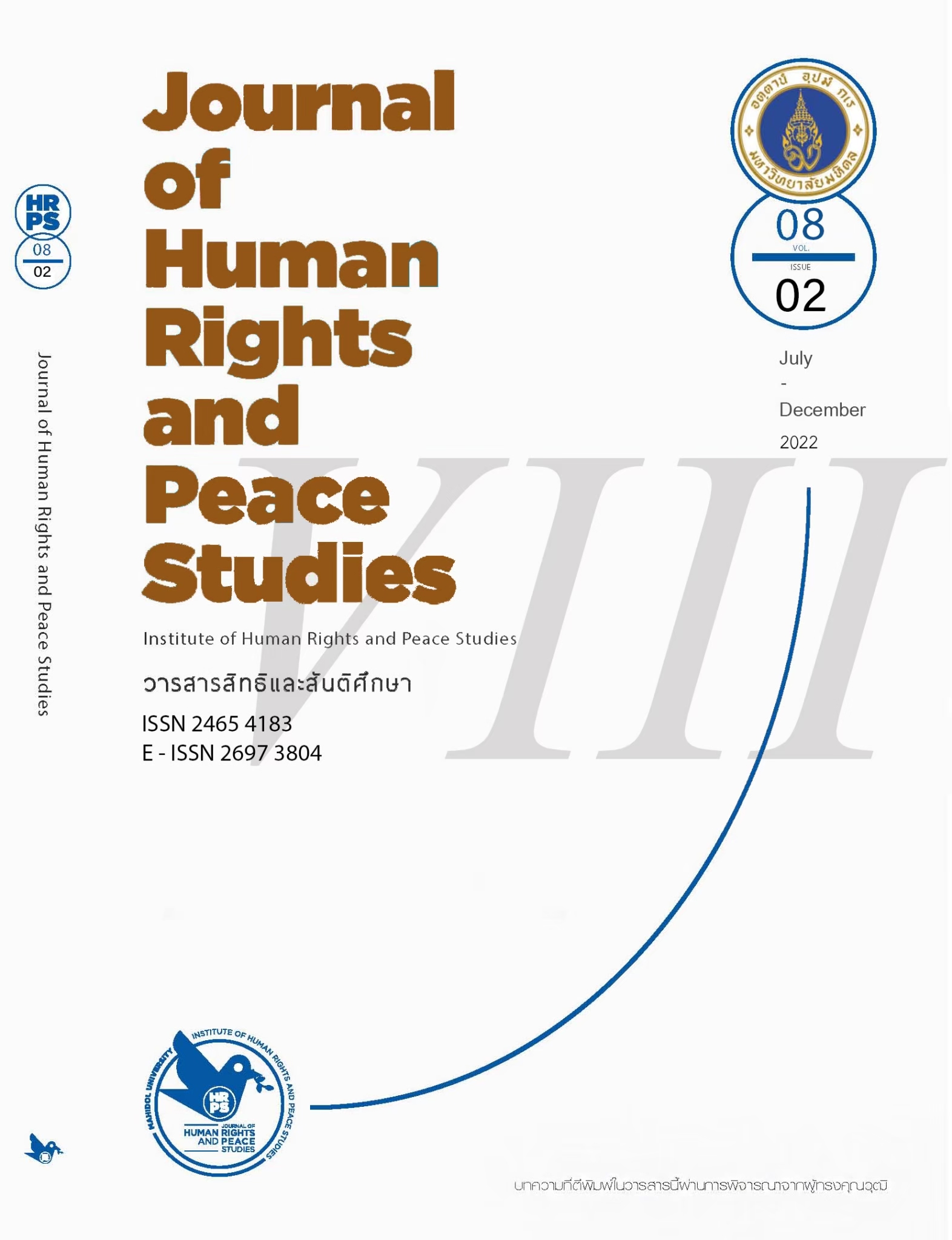The Development of Learning Management Model to Promote Media, Information and Digital Literacy of Citizenship Competencies for Undergraduate Students in Democratic Citizenship Education Course.
Main Article Content
Abstract
This research aims to: 1) Develop a learning management model to promote media, information and digital literacy of citizenship competencies for undergraduates in democratic citizenship education course. 2) Study the results of the development of media, information and digital literacy of citizenship commences by applying the learning process for changing as a basis for undergraduate students in democratic citizenship education courses. The research found that the model of learning management, the development of media, information and digital literacy of citizenship competencies for undergraduate students in the course of democratic citizenship education consists of 3 learning stages: The learning stage 1, in the week of 1-6 (24 hours), is a learning curve in the classroom that emphasize key concepts to promote democratic citizenship in information and digital media using experiential learning and transformative learning which have the integration of content and processes to enhance the way students think. The learning stage 2, in the week of 7-13 (28 hours), is a field learning and after action review using the Project-Based Learning. The researcher defined some 50 volunteers who did the democratic projects by becoming a democracy coach. The learning stage 3, in the week of 14-16 (12 hours), is the week of learning in the classroom to study key issues after the completion of the course. There are 4 stages of instruction: 1) The situation confrontation 2) The experience reconstruction 3) The transition through practice and 4) The reflective thinking to enhance the learning paradigm.
Article Details

This work is licensed under a Creative Commons Attribution-NonCommercial-NoDerivatives 4.0 International License.
The views, opinions, and pictures expressed in this journal are those of the authors and do not necessarily reflect the opinions and viewpoints of the editor and the editorial board. All rights are reserved by the authors and the Institute of Human Rights and Peace Studies of Mahidol University. No part of this journal may be reproduced, stored in a retrieval system, or transmitted in any form or by any means without the prior permission in writing from the journal’s editor, or as expressly permitted by law, or under terms agreed with the appropriate reprographics rights organization. Non-commercial use of information in this journal must be properly referenced.
References
Biggins, O. (2011). Media and information literacy toolkit. Dhurakij Pundit University. (In Thai)
Buckingham, D. (2003). Media education: Literacy, learning, and contemporary culture. Polity Press.
Center for Media Literacy. (n.d.). Canada offers ten classroom approaches to media literacy. Retrieved July 7, 2015, from http://www.medialit.org/readingroom/canadaofferstenclassroomapproachesmedialiteracy
Chuasathapanasiri, T. (2015). Lao rư̄ang khām sư̄ [Transmedia:story-telling]. Journal of Communication and Innovation NIDA, 2(1), 59 – 88. (In Thai)
Duderstadt, J. J. (2000). New roles for the 21st-century university. Issues in Science and Technology, 16(2). https://issues.org/duderstadt/
Hobbs, R., & Froast, R. (1999). Instructional practices in media literacy education and their impact on students’ learning. New Jersey Journal of Communication, 6(2), 123-148. https://doi.org/10.1080/15456879809367343
Narkurairattana, P. (2021). [Review of the book Universities and conflict: The role of higher education in peacebuilding and resistance, by J. Millican]. Journal of Human Rights and Peace Studies, 7(Supplymental), 223–232. https://so03.tci-thaijo.org/index.php/HRPS/article/view/258989
P21 Partnership for 21st Century Learning. (2007). Framework for 21st century learning. Battelle for Kids. Retrieved July 7, 2015, from http://www.p21.org/our-work/p21-framework
Potter, W. J. (2014). Media Literacy. (7th ed.). Sage.
Pounpunwong, W., & Foojakham, P. (2020). Khrū sit : khwāmsamphan bǣp ʻānātniyom khwām mư̄t bō̜t khō̜ng kān thāithō̜t ʻongkhwāmrū [Teacher -Student: Authoritarianism in Relationship and Error of Body of Knowledge’ Transmittance]. Nakhon Lampang Buddhist’s Journal, 9(3), 246-259. https://so04.tci-thaijo.org/index.php/NBJ/article/view/251605. (In Thai).
Samakoses, V. (2016, March 9). The fourth industrial revolution. ThaiPublica. https://thaipublica.org/2016/03/varakorn-153/
Scheibe, C., & Roger, F. (2008). 12 Basic ways to integrate media literacy and critical thinking into any curriculum (3rd ed.). Project Look Sharp, Ithaca College. Retrieved July 7, 2015, from http://www.projectlooksharp.org/Resources%202/12BasicWaysBooklet.pdf
Schwab, K. (2017). The fourth industrial revolution. Crown Publishing Group.
Senthong, P. (2019). ʻudomkān thāngkān mư̄ang: ʻudomkān thāngkān mư̄ang Thai [The political ideology: Thai political ideology]. Journal of Graduate Studies Valaya Alongkron Rajabhat University, 13(3), 230-248. https://so02.tci-thaijo.org/index.php/JournalGradVRU/article/view/161357
Sutthinarakorn, W. (2017). kānwičhai chœ̄ng patibatkān nai chan rīan [Transformative learning and action research]. Siam. (in Thai)
Tepnarin, P. (2019). rabop khit chœ̄ng hētphon khō̜ng kānsưksā phư̄a sāng khwāmpen phonlamư̄ang nai sangkhom Thai [The rationality of civic education in Thailand]. Journal of Politics, Administration and Law, 12(1), 93-117. https://so03.tci-thaijo.org/index.php/polscilaw_journal/article/view/245981
Thoman, E. & Jolls, T. (2003). Literacy for the 21st century: An overview & orientation guide to media literacy education. Center for Media Literacy. Retrieved July 7, 2015, from http://www.medialit.org/sites/default/files/01_MLKorientation.pdf.
Thoman, E., & Jolls, T. (2005). Media literacy education: Lessons from the center for media literacy. In G. Schwarz, P. Brown (Eds.). Media literacy : Transforming curriculum and teaching (pp. 180-205).
Thongsrikam, S. (2016). Video streaming: bō̜ribot khō̜ng phāpyonʻō̜nlai nai watthanatham ( dičhithan ) sưksā [Video streaming: In the cultural context of digital film online]. Asian Journal of Arts and Culture, 16(1), 143-160. https://so06.tci-thaijo.org/index.php/cjwu/article/view/95386. (in Thai)
United Nations Educational, Scientific and Cultural Organization. (1998). World declaration on higher education for the twenty-first century: Vision and action world conference on higher education. Retrieved July 7, 2015, from https://bice.org/app/uploads/2014/10/unesco_world_declaration_on_higher_education_for_the_twenty_first_century_vision_and_action.pdf
United Nations Educational, Scientific and Cultural Organization. (2013). Global media and information literacy assessment framework: Country readiness and competencies. Retrieved July 8, 2015, from https://unesdoc.unesco.org/ark:/48223/pf0000224655
United Nations Educational, Scientific and Cultural Organization. (2011). Media and information literacy curriculum for teachers. Retrieved July 8, 2015, from https://unesdoc.unesco.org/ark:/48223/pf0000192971?posInSet=4&queryId=f7ec91b1-5aef-4494-884d-effd8efffbf7
United Nations Educational, Scientific and Cultural Organization. (2013). Media and information literacy: Policy and strategy guidelines. Retrieved July 7, 2015, from https://unesdoc.unesco.org/ark:/48223/pf0000225606?posInSet=1&queryId=94d00fc0-8c24-4652-b78c-12e157917b9d
Wongwanich, S. (2014). kānwičhai pramœ̄n khwāmtō̜ngkān čhampen [Needs assessment research]. Chulalongkorn University. (In Thai)
Xuto, N. (2002). Qualitative research. Print-pro. (In Thai)
Yeganeh, B, & Kolb, D. (2009). Mindfulness and experiential learning. https://www.bumc.bu.edu/medsci/files/2018/11/Mindfulness_Experiential_Learning_-_Yeganeh__Kolb.pdf.


